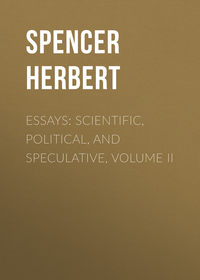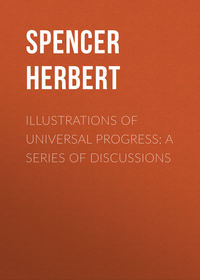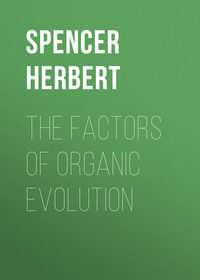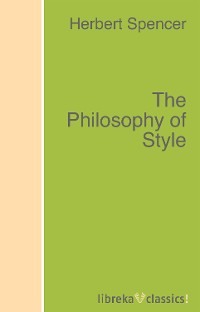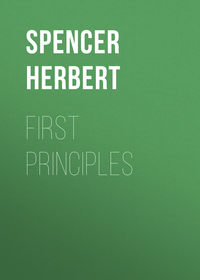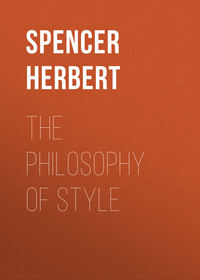 полная версия
полная версияEssays on Education and Kindred Subjects
Of course the ideal of education is – complete preparation in all these divisions. But failing this ideal, as in our phase of civilisation every one must do more or less, the aim should be to maintain a due proportion between the degrees of preparation in each. Not exhaustive cultivation in any one, supremely important though it may be – not even an exclusive attention to the two, three, or four divisions of greatest importance; but an attention to all: – greatest where the value is greatest; less where the value is less; least where the value is least. For the average man (not to forget the cases in which peculiar aptitude for some one department of knowledge, rightly makes pursuit of that one the bread-winning occupation) – for the average man, we say, the desideratum is, a training that approaches nearest to perfection in the things which most subserve complete living, and falls more and more below perfection in the things that have more and more remote bearings on complete living.
In regulating education by this standard, there are some general considerations that should be ever present to us. The worth of any kind of culture, as aiding complete living, may be either necessary or more or less contingent. There is knowledge of intrinsic value; knowledge of quasi-intrinsic value; and knowledge of conventional value. Such facts as that sensations of numbness and tingling commonly precede paralysis, that the resistance of water to a body moving through it varies as the square of the velocity, that chlorine is a disinfectant, – these, and the truths of Science in general, are of intrinsic value: they will bear on human conduct ten thousand years hence as they do now. The extra knowledge of our own language, which is given by an acquaintance with Latin and Greek, may be considered to have a value that is quasi-intrinsic: it must exist for us and for other races whose languages owe much to these sources; but will last only as long as our languages last. While that kind of information which, in our schools, usurps the name History – the mere tissue of names and dates and dead unmeaning events – has a conventional value only: it has not the remotest bearing on any of our actions; and is of use only for the avoidance of those unpleasant criticisms which current opinion passes upon its absence. Of course, as those facts which concern all mankind throughout all time must be held of greater moment than those which concern only a portion of them during a limited era, and of far greater moment than those which concern only a portion of them during the continuance of a fashion; it follows that in a rational estimate, knowledge of intrinsic worth must, other things equal, take precedence of knowledge that is of quasi-intrinsic or conventional worth.
One further preliminary. Acquirement of every kind has two values – value as knowledge and value as discipline. Besides its use for guiding conduct, the acquisition of each order of facts has also its use as mental exercise; and its effects as a preparative for complete living have to be considered under both these heads.
These, then, are the general ideas with which we must set out in discussing a curriculum: – Life as divided into several kinds of activity of successively decreasing importance; the worth of each order of facts as regulating these several kinds of activity, intrinsically, quasi-intrinsically, and conventionally; and their regulative influences estimated both as knowledge and discipline.
Happily, that all-important part of education which goes to secure direct self-preservation, is in great part already provided for. Too momentous to be left to our blundering, Nature takes it into her own hands. While yet in its nurse's arms, the infant, by hiding its face and crying at the sight of a stranger, shows the dawning instinct to attain safety by flying from that which is unknown and may be dangerous; and when it can walk, the terror it manifests if an unfamiliar dog comes near, or the screams with which it runs to its mother after any startling sight or sound, shows this instinct further developed. Moreover, knowledge subserving direct self-preservation is that which it is chiefly busied in acquiring from hour to hour. How to balance its body; how to control its movements so as to avoid collisions; what objects are hard, and will hurt if struck; what objects are heavy, and injure if they fall on the limbs; which things will bear the weight of the body, and which not; the pains inflicted by fire, by missiles, by sharp instruments – these, and various other pieces of information needful for the avoidance of death or accident, it is ever learning. And when, a few years later, the energies go out in running, climbing, and jumping, in games of strength and games of skill, we see in all these actions by which the muscles are developed, the perceptions sharpened, and the judgment quickened, a preparation for the safe conduct of the body among surrounding objects and movements; and for meeting those greater dangers that occasionally occur in the lives of all. Being thus, as we say, so well cared for by Nature, this fundamental education needs comparatively little care from us. What we are chiefly called upon to see, is, that there shall be free scope for gaining this experience and receiving this discipline – that there shall be no such thwarting of Nature as that by which stupid schoolmistresses commonly prevent the girls in their charge from the spontaneous physical activities they would indulge in; and so render them comparatively incapable of taking care of themselves in circumstances of peril.
This, however, is by no means all that is comprehended in the education that prepares for direct self-preservation. Besides guarding the body against mechanical damage or destruction, it has to be guarded against injury from other causes – against the disease and death that follow breaches of physiologic law. For complete living it is necessary, not only that sudden annihilations of life shall be warded off; but also that there shall be escaped the incapacities and the slow annihilation which unwise habits entail. As, without health and energy, the industrial, the parental, the social, and all other activities become more or less impossible; it is clear that this secondary kind of direct self-preservation is only less important than the primary kind; and that knowledge tending to secure it should rank very high.
It is true that here, too, guidance is in some measure ready supplied. By our various physical sensations and desires, Nature has insured a tolerable conformity to the chief requirements. Fortunately for us, want of food, great heat, extreme cold, produce promptings too peremptory to be disregarded. And would men habitually obey these and all like promptings when less strong, comparatively few evils would arise. If fatigue of body or brain were in every case followed by desistance; if the oppression produced by a close atmosphere always led to ventilation; if there were no eating without hunger, or drinking without thirst; then would the system be but seldom out of working order. But so profound an ignorance is there of the laws of life, that men do not even know that their sensations are their natural guides, and (when not rendered morbid by long – continued disobedience) their trustworthy guides. So that though, to speak teleologically, Nature has provided efficient safeguards to health, lack of knowledge makes them in a great measure useless.
If any one doubts the importance of an acquaintance with the principles of physiology, as a means to complete living, let him look around and see how many men and women he can find in middle or later life who are thoroughly well. Only occasionally do we meet with an example of vigorous health continued to old age; hourly do we meet with examples of acute disorder, chronic ailment, general debility, premature decrepitude. Scarcely is there one to whom you put the question, who has not, in the course of his life, brought upon himself illnesses which a little information would have saved him from. Here is a case of heart-disease consequent on a rheumatic fever that followed reckless exposure. There is a case of eyes spoiled for life by over-study. Yesterday the account was of one whose long-enduring lameness was brought on by continuing, spite of the pain, to use a knee after it had been slightly injured. And to-day we are told of another who has had to lie by for years, because he did not know that the palpitation he suffered under resulted from overtaxed brain. Now we hear of an irremediable injury which followed some silly feat of strength; and, again, of a constitution that has never recovered from the effects of excessive work needlessly undertaken. While on every side we see the perpetual minor ailments which accompany feebleness. Not to dwell on the pain, the weariness, the gloom, the waste of time and money thus entailed, only consider how greatly ill-health hinders the discharge of all duties – makes business often impossible, and always more difficult; produces an irritability fatal to the right management of children; puts the functions of citizenship out of the question; and makes amusement a bore. Is it not clear that the physical sins – partly our forefathers' and partly our own – which produce this ill-health, deduct more from complete living than anything else? and to a great extent make life a failure and a burden instead of a benefaction and a pleasure?
Nor is this all. Life, besides being thus immensely deteriorated, is also cut short. It is not true, as we commonly suppose, that after a disorder or disease from which we have recovered, we are as before. No disturbance of the normal course of the functions can pass away and leave things exactly as they were. A permanent damage is done – not immediately appreciable, it may be, but still there; and along with other such items which Nature in her strict account-keeping never drops, it will tell against us to the inevitable shortening of our days. Through the accumulation of small injuries it is that constitutions are commonly undermined, and break down, long before their time. And if we call to mind how far the average duration of life falls below the possible duration, we see how immense is the loss. When, to the numerous partial deductions which bad health entails, we add this great final deduction, it results that ordinarily one-half of life is thrown away.
Hence, knowledge which subserves direct self-preservation by preventing this loss of health, is of primary importance. We do not contend that possession of such knowledge would by any means wholly remedy the evil. It is clear that in our present phase of civilisation, men's necessities often compel them to transgress. And it is further clear that, even in the absence of such compulsion, their inclinations would frequently lead them, spite of their convictions, to sacrifice future good to present gratification. But we do contend that the right knowledge impressed in the right way would effect much; and we further contend that as the laws of health must be recognised before they can be fully conformed to, the imparting of such knowledge must precede a more rational living – come when that may. We infer that as vigorous health and its accompanying high spirits are larger elements of happiness than any other things whatever, the teaching how to maintain them is a teaching that yields in moment to no other whatever. And therefore we assert that such a course of physiology as is needful for the comprehension of its general truths, and their bearings on daily conduct, is an all-essential part of a rational education.
Strange that the assertion should need making! Stranger still that it should need defending! Yet are there not a few by whom such a proposition will be received with something approaching to derision. Men who would blush if caught saying Iphigénia instead of Iphigenía, or would resent as an insult any imputation of ignorance respecting the fabled labours of a fabled demi-god, show not the slightest shame in confessing that they do not know where the Eustachian tubes are, what are the actions of the spinal cord, what is the normal rate of pulsation, or how the lungs are inflated. While anxious that their sons should be well up in the superstitions of two thousand years ago, they care not that they should be taught anything about the structure and functions of their own bodies – nay, even wish them not to be so taught. So overwhelming is the influence of established routine! So terribly in our education does the ornamental over-ride the useful!
We need not insist on the value of that knowledge which aids indirect self-preservation by facilitating the gaining of a livelihood. This is admitted by all; and, indeed, by the mass is perhaps too exclusively regarded as the end of education. But while every one is ready to endorse the abstract proposition that instruction fitting youths for the business of life is of high importance, or even to consider it of supreme importance; yet scarcely any inquire what instruction will so fit them. It is true that reading, writing, and arithmetic are taught with an intelligent appreciation of their uses. But when we have said this we have said nearly all. While the great bulk of what else is acquired has no bearing on the industrial activities, an immensity of information that has a direct bearing on the industrial activities is entirely passed over.
For, leaving out only some very small classes, what are all men employed in? They are employed in the production, preparation, and distribution of commodities. And on what does efficiency in the production, preparation, and distribution of commodities depend? It depends on the use of methods fitted to the respective natures of these commodities; it depends on an adequate acquaintance with their physical, chemical, or vital properties, as the case may be; that is, it depends on Science. This order of knowledge which is in great part ignored in our school-courses, is the order of knowledge underlying the right performance of those processes by which civilised life is made possible. Undeniable as is this truth, there seems to be no living consciousness of it: its very familiarity makes it unregarded. To give due weight to our argument, we must, therefore, realise this truth to the reader by a rapid review of the facts.
Passing over the most abstract science, Logic, on the due guidance by which, however, the large producer or distributor depends, knowingly or unknowingly, for success in his business-forecasts, we come first to Mathematics. Of this, the most general division, dealing with number, guides all industrial activities; be they those by which processes are adjusted, or estimates framed, or commodities bought and sold, or accounts kept. No one needs to have the value of this division of abstract science insisted upon.
For the higher arts of construction, some acquaintance with the more special division of Mathematics is indispensable. The village carpenter, who lays out his work by empirical rules, equally with the builder of a Britannia Bridge, makes hourly reference to the laws of space-relations. The surveyor who measures the land purchased; the architect in designing a mansion to be built on it; the builder when laying out the foundations; the masons in cutting the stones; and the various artizans who put up the fittings; are all guided by geometrical truths. Railway-making is regulated from beginning to end by geometry: alike in the preparation of plans and sections; in staking out the line; in the mensuration of cuttings and embankments; in the designing and building of bridges, culverts, viaducts, tunnels, stations. Similarly with the harbours, docks, piers, and various engineering and architectural works that fringe the coasts and overspread the country, as well as the mines that run underneath it. And now-a-days, even the farmer, for the correct laying-out of his drains, has recourse to the level – that is, to geometrical principles.
Turn next to the Abstract-Concrete sciences. On the application of the simplest of these, Mechanics, depends the success of modern manufactures. The properties of the lever, the wheel-and-axle, etc., are recognised in every machine, and to machinery in these times we owe all production. Trace the history of the breakfast-roll. The soil out of which it came was drained with machine-made tiles; the surface was turned over by a machine; the wheat was reaped, thrashed, and winnowed by machines; by machinery it was ground and bolted; and had the flour been sent to Gosport, it might have been made into biscuits by a machine. Look round the room in which you sit. If modern, probably the bricks in its walls were machine-made; and by machinery the flooring was sawn and planed, the mantel-shelf sawn and polished, the paper-hangings made and printed. The veneer on the table, the turned legs of the chairs, the carpet, the curtains, are all products of machinery. Your clothing – plain, figured, or printed – is it not wholly woven, nay, perhaps even sewed, by machinery? And the volume you are reading – are not its leaves fabricated by one machine and covered with these words by another? Add to which that for the means of distribution over both land and sea, we are similarly indebted. And then observe that according as knowledge of mechanics is well or ill applied to these ends, comes success or failure. The engineer who miscalculates the strength of materials, builds a bridge that breaks down. The manufacturer who uses a bad machine cannot compete with another whose machine wastes less in friction and inertia. The ship-builder adhering to the old model is out-sailed by one who builds on the mechanically-justified wave-line principle. And as the ability of a nation to hold its own against other nations, depends on the skilled activity of its units, we see that on mechanical knowledge may turn the national fate.
On ascending from the divisions of Abstract-Concrete science dealing with molar forces, to those divisions of it which deal with molecular forces, we come to another vast series of applications. To this group of sciences joined with the preceding groups we owe the steam-engine, which does the work of millions of labourers. That section of physics which formulates the laws of heat, has taught us how to economise fuel in various industries; how to increase the produce of smelting furnaces by substituting the hot for the cold blast; how to ventilate mines; how to prevent explosions by using the safety-lamp; and, through the thermometer, how to regulate innumerable processes. That section which has the phenomena of light for its subject, gives eyes to the old and the myopic; aids through the microscope in detecting diseases and adulterations; and, by improved lighthouses, prevents shipwrecks. Researches in electricity and magnetism have saved innumerable lives and incalculable property through the compass; have subserved many arts by the electrotype; and now, in the telegraph, have supplied us with an agency by which for the future, mercantile transactions will be regulated and political intercourse carried on. While in the details of in-door life, from the improved kitchen-range up to the stereoscope on the drawing-room table, the applications of advanced physics underlie our comforts and gratifications.
Still more numerous are the applications of Chemistry. The bleacher, the dyer, the calico-printer, are severally occupied in processes that are well or ill done according as they do or do not conform to chemical laws. Smelting of copper, tin, zinc, lead, silver, iron, must be guided by chemistry. Sugar-refining, gas-making, soap-boiling, gunpowder-manufacture, are operations all partly chemical; as are likewise those which produce glass and porcelain. Whether the distiller's wort stops at the alcoholic fermentation or passes into the acetous, is a chemical question on which hangs his profit or loss; and the brewer, if his business is extensive, finds it pay to keep a chemist on his premises. Indeed, there is now scarcely any manufacture over some part of which chemistry does not preside. Nay, in these times even agriculture, to be profitably carried on, must have like guidance. The analysis of manures and soils; the disclosure of their respective adaptations; the use of gypsum or other substance for fixing ammonia; the utilisation of coprolites; the production of artificial manures – all these are boons of chemistry which it behoves the farmer to acquaint himself with. Be it in the lucifer match, or in disinfected sewage, or in photographs – in bread made without fermentation, or perfumes extracted from refuse, we may perceive that chemistry affects all our industries; and that, therefore, knowledge of it concerns every one who is directly or indirectly connected with our industries.
Of the Concrete sciences, we come first to Astronomy. Out of this has grown that art of navigation which has made possible the enormous foreign commerce that supports a large part of our population, while supplying us with many necessaries and most of our luxuries.
Geology, again, is a science knowledge of which greatly aids industrial success. Now that iron ores are so large a source of wealth; now that the duration of our coal-supply has become a question of great interest; now that we have a College of Mines and a Geological Survey; it is scarcely needful to enlarge on the truth that the study of the Earth's crust is important to our material welfare.
And then the science of life – Biology: does not this, too, bear fundamentally on these processes of indirect self-preservation? With what we ordinarily call manufactures, it has, indeed, little connection; but with the all-essential manufacture – that of food – it is inseparably connected. As agriculture must conform its methods to the phenomena of vegetal and animal life, it follows that the science of these phenomena is the rational basis of agriculture. Various biological truths have indeed been empirically established and acted upon by farmers, while yet there has been no conception of them as science; such as that particular manures are suited to particular plants; that crops of certain kinds unfit the soil for other crops; that horses cannot do good work on poor food; that such and such diseases of cattle and sheep are caused by such and such conditions. These, and the every-day knowledge which the agriculturist gains by experience respecting the management of plants and animals, constitute his stock of biological facts; on the largeness of which greatly depends his success. And as these biological facts, scanty, indefinite, rudimentary, though they are, aid him so essentially; judge what must be the value to him of such facts when they become positive, definite, and exhaustive. Indeed, even now we may see the benefits that rational biology is conferring on him. The truth that the production of animal heat implies waste of substance, and that, therefore, preventing loss of heat prevents the need for extra food – a purely theoretical conclusion – now guides the fattening of cattle: it is found that by keeping cattle warm, fodder is saved. Similarly with respect to variety of food. The experiments of physiologists have shown that not only is change of diet beneficial, but that digestion is facilitated by a mixture of ingredients in each meal. The discovery that a disorder known as "the staggers," of which many thousands of sheep have died annually, is caused by an entozoon which presses on the brain, and that if the creature is extracted through the softened place in the skull which marks its position, the sheep usually recovers, is another debt which agriculture owes to biology.
Yet one more science have we to note as bearing directly on industrial success – the Science of Society. Men who daily look at the state of the money-market glance over prices current; discuss the probable crops of corn, cotton, sugar, wool, silk; weigh the chances of war; and from these data decide on their mercantile operations; are students of social science: empirical and blundering students it may be; but still, students who gain the prizes or are plucked of their profits, according as they do or do not reach the right conclusion. Not only the manufacturer and the merchant must guide their transactions by calculations of supply and demand, based on numerous facts, and tacitly recognising sundry general principles of social action; but even the retailer must do the like: his prosperity very greatly depending upon the correctness of his judgments respecting the future wholesale prices and the future rates of consumption. Manifestly, whoever takes part in the entangled commercial activities of a community, is vitally interested in understanding the laws according to which those activities vary.


